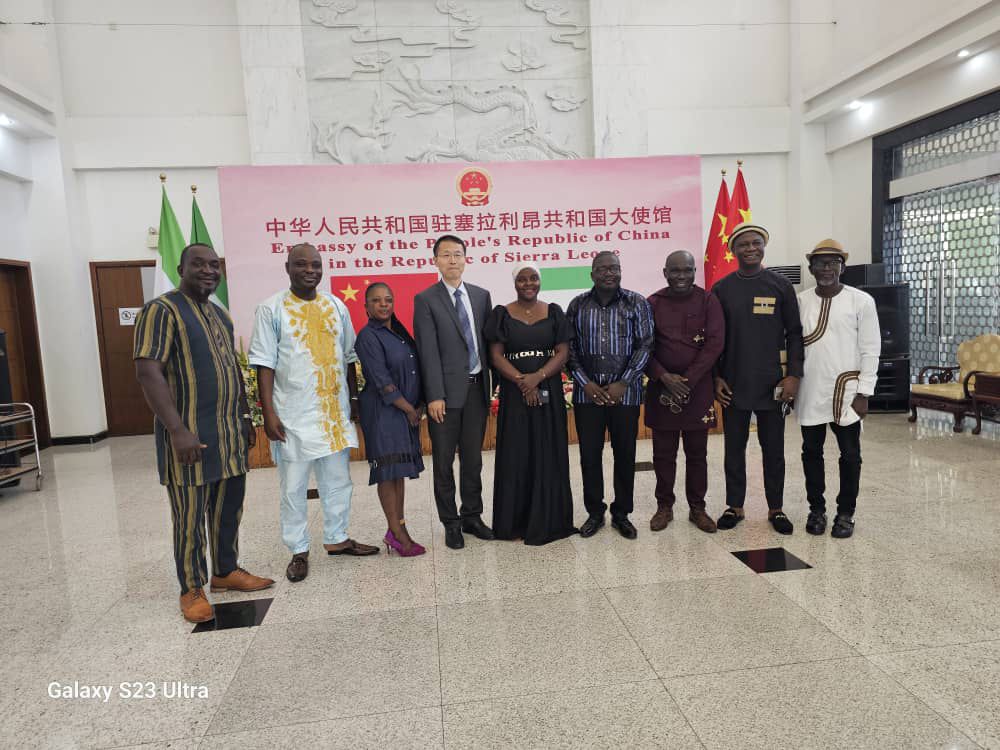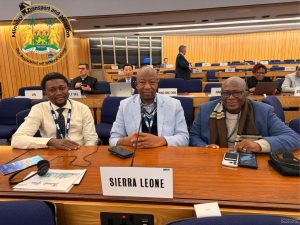Chinese Embassy Welcomes SL Broadcasters’ Association for Strategic Media Engagement

The Chinese Embassy in Freetown hosted executive members of the Sierra Leone Broadcasters’ Association (SiLBA) on Friday, 16th August 2024, marking a significant step in the association’s ongoing efforts to strengthen ties with key media stakeholders, development partners, and potential donors.
Founded two years ago and registered with the Corporate Affairs Commission in Sierra Leone, SiLBA is a non-profit organization committed to serving as the national umbrella association for broadcasters across the country. The association’s core mission is to protect the rights, collective interests, and welfare of its members while striving to elevate professional standards within the broadcasting sector.
SiLBA, which currently boasts a membership of 100 individuals and over 55 radio and TV stations nationwide, envisions the creation of an inclusive, competitive, thriving, and sustainable media environment. This environment is designed to meet the diverse needs and interests of broadcasters and electronic media institutions across Sierra Leone.
Operating from its headquarters at 48 Jenner Wright Road, Upgun, Freetown, SiLBA is driven by a mission to promote unity, professionalism, cooperation, and best practices among broadcasters. The association advocates for improved broadcasting standards through strategic programming that is both gender-sensitive and development-focused.
SiLBA’s objectives are broad and multifaceted, encompassing key areas such as advancing the welfare of individual members, addressing national broadcasting issues, promoting a free and responsible press, and advocating for the sustainability and profitability of broadcasting institutions. Additionally, SiLBA is committed to supporting content creation and technological innovation, facilitating training opportunities, and fostering networking with global entities to promote the association’s interests on a broader scale.
In clarifying its relationship with other media interest organizations, SiLBA emphasized its role as a complementary force to existing bodies such as the Sierra Leone Association of Journalists (SLAJ), the Sierra Leone Reporters Union (SLRU), and the Independent Media Commission (IMC). The association collaborates closely with these organizations, along with media development partners like the Media Reform Coordinating Group (MRCG), Independent Radio Network (IRN), Guild of Editors, BBC Media Action, and Talking Drum Studio, to achieve shared goals through varied approaches.
During the meeting, Zhang Dianbin, Minister Counsellor at the Chinese Embassy, acknowledged the pivotal role that media, particularly broadcast media, plays in disseminating credible information to the public. He emphasized the importance of SiLBA’s mission and encouraged the association to amplify the values and achievements of China on a global stage. Minister Counsellor Zhang also reaffirmed the embassy’s commitment to supporting SiLBA’s initiatives, inviting the association to submit a detailed proposal outlining their priority areas for further collaboration.
In response, SiLBA expressed deep gratitude for the embassy’s willingness to partner with them, reaffirming their commitment to fostering mutual understanding and cooperation between the two entities. The association outlined its immediate priorities for the coming year, which include securing dedicated office space, developing an official website, engaging in international partnerships, organizing exchange visits, mobilizing memberships, and enhancing institutional capacity through targeted training programs. Additionally, SiLBA aims to secure grants for acquiring essential radio equipment and implement projects focusing on various media-related topics.
As the dialogue between the Sierra Leone Broadcasters’ Association and the Chinese Embassy continues, both parties look forward to strengthening their relationship and advancing Sierra Leone’s media landscape through collaborative initiatives and shared objectives. This engagement marks a crucial step toward fostering a dynamic media environment that not only upholds high professional standards but also supports media professionals and serves the public’s right to access accurate and informative content.





